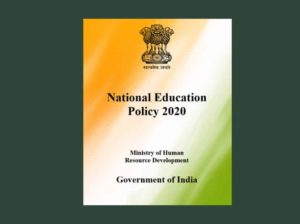
The Government of India has envisioned the rolling out of National Education Policy – 2020. The policy highlights on the importance of languages or the multilingual approach. However this has either been rubbished or swept aside due to obvious political reasons at the regional level. The NEP has clarified that the multi-lingual approaches are intended towards national integration and will be implemented flexibly without imposing on the states. Therefore it is important for the citizens to understand the truth about NEP 2020 from the perspective of ‘languages’ before accepting or falling for any biased arguments against it.
NEP -2020 and the ‘language’ approach –
The National Education Policy – 2020 lays emphasis on language education like never before. It gives prominence and preference to school teaching in the local language and mother tongue of the students in schools up to grade/class 5 and if possible also in the later stages. For this, teaching materials in various Indian languages will be provided and teachers will also be trained in it. The NEP also puts equal emphasis on language too just like other subjects like science, social science, arts, sports, mathematics etc. The policy also specifies for a flexible bilingual approach as per the requirement and the recruitment preferences is given to teachers who are fluent in the local language. The policy offers a unique option for the state governments to have bilateral agreements with other states to hire teachers for teaching multiple languages in the respective states.
The three-language formula has the potential to improve the language skills of crores of students and providing employment opportunities to thousands of teachers in the coming years. Moreover, the policy also recommends bilingual education in law for lawyers and judges i.e. in English and the language of the state whose institution is offering the course of study. This is but a solution to the challenges in delayed justice delivery due to the time taken for translation. Development of scientific vocabulary in Indian languages, research and promotion of classical languages, upgradation and strengthening of existing language and literature institutions have also been recommended in the NEP 2020.
Through the promotion of Indian languages, the NEP 2020 envisions the preservation of culture and traditions of each region by including language as an essential part of education in schools. This way the diverse thought process is imbibed in the students resulting in mutual respect of other Indian languages apart from developing better understanding and capability in conversing ideas in one’s own mother tongue right from an early age. It is beyond doubt that through this attempt preservation of historical vibrancy, cultural uniqueness and rich literary heritage at the regional level can be possible.
Opportunities of learning a new language –
The state governments and regional political parties should see the language perspectives of the NEP 2020 as an opportunity to strengthen the socio-cultural roots of the respective regional languages and the cultural heritage associated with it. To learn a new language, be it Indian or foreign, is an opportunity for students to increase their skill-based competitiveness in today’s globalized world. Learning a new language today has become as important as learning computer programming was in the 1990s and 2000s.The modern globe is a world of diverse ideas and the person who can communicate efficiently is definitely in an advantageous position.
To think that learning a new language would cause grave demographic impact and lead to hijacking of the language discourse by some non-native language is too narrow-minded. Today, India is a country where aspiring people are open to learning multiple foreign languages like Arabic, French, and Russian apart from grooming their spoken English skills to suit the growing needs of corporate, business and diplomatic negotiations. The same shall also apply in learning a second Indian language for one to expand opportunities in India. Anyone who does not accept this argument as above should verify for themselves from the fast-evolving global trends. It’s time we expand our views towards open and diverse thinking. To learn and speak a new Indian language would enable one to converse thoughts and exchange ideas with a person of different mother tongue and understand the trans-culture that India has to offer.
Selfish Politics of Language –
Citizens should think logical enough to be practical and attempt to socially and politically defend narratives that prevent school students from learning a new language. Regional political parties and politicians who are just worried about their stability and political career in the name of language politics must be questioned : why have their children prospered enough to speak fluently in other languages? Silly political debates in the name of saffronisation of culture, language imposition, rights of linguistic minorities are but the politics that are destroying the opportunities of an entire generation. Let’s remember that the National Education Policy aims to ensure the preservation, growth, and vibrancy of all Indian languages.
Writer is currently a Research Scholar at the Centre for Studies in Science Policy (CSSP), Jawaharlal Nehru University, New Delhi.

